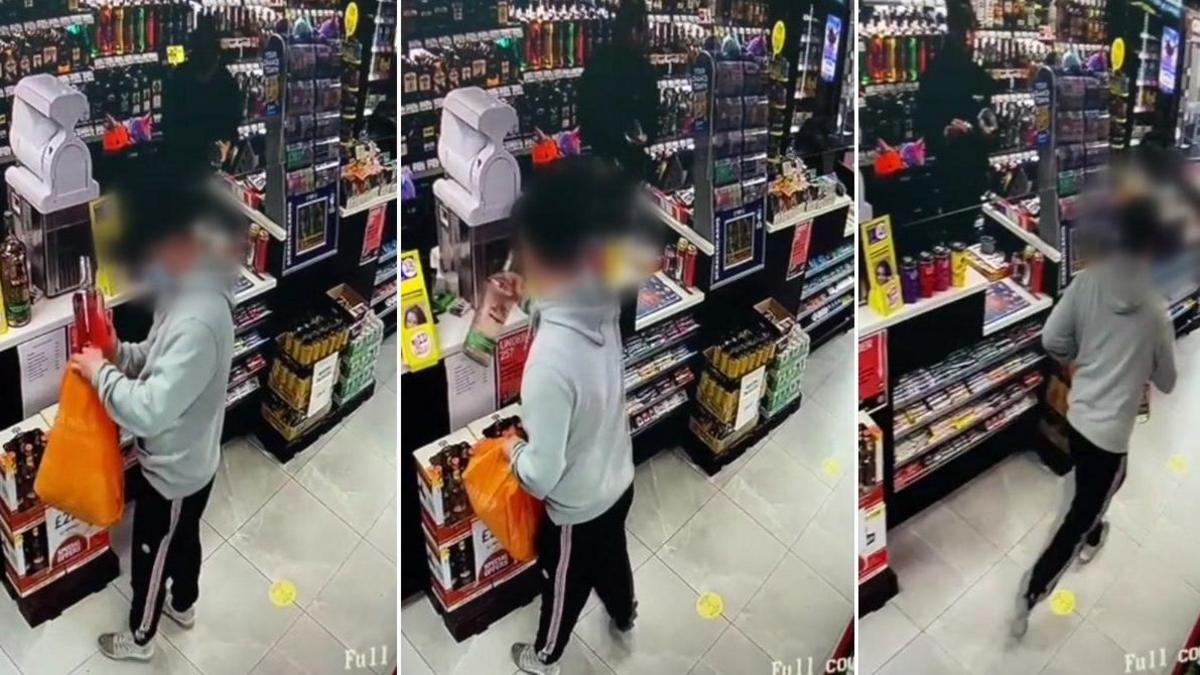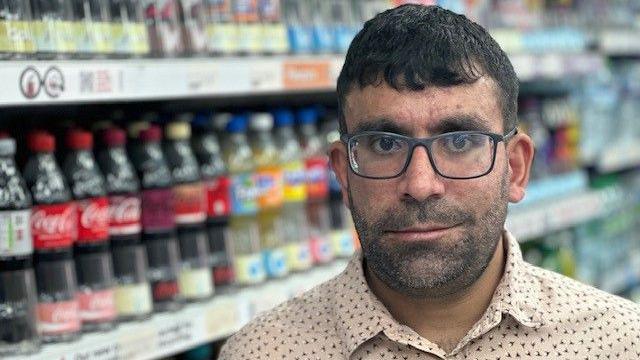Shopkeepers urge action over 'spiralling' shoplifting

CCTV captures one shoplifter brazenly making off with two bottles of gin, right in front of a shop worker
- Published
In the run up to the general election, the BBC is looking at issues that matter the most to you, as part of Your Voice, Your Vote. One theme has been the impact of shoplifting and anti-social behaviour. Mark Denten has been hearing people’s experiences.
The shop security camera captures it all.
A man walks in, takes two bottles of gin and simply walks out without paying - all right in front of a member of staff on the till.
This is Peter Saleem’s business in Blyth, Northumberland. It has been in the family for more than 20 years.
He shows me more CCTV footage showing one of his staff grappling with a shoplifter trying to clear a shelf of stock. Shoplifting, he says, is a daily occurrence.

Peter Saleem, owner of Broadway Supermarket in Blyth, has called for more police
"The problem has really spiralled out of control," he says.
"They’re career criminals these chaps. The shoplifters are well aware they’re not going to be prosecuted, they’re not even going to be pulled in for it.
"We need increased numbers of police - so if somebody steals they get pulled in for it and they get prosecuted."
'Zero police response'
According to Home Office recorded crime figures, there were more than 36,000 cases of shoplifting in the North East, Cumbria and North Yorkshire in 2023.
The figure went up by 46% in the North East in a year - the highest percentage increase outside London.
But business owners like Peter reckon those numbers underestimate the scale of the problem, with police sometimes offering "zero" response to shoplifting - merely issuing a crime number.
The Anti-Social Behaviour, Crime and Policing Act 2014 says a theft of under £200 is a summary offence with a maximum penalty of £70.

Neeraj Bedi, manager of Metro Express in Newcastle, says his staff are "fearful"
Neeraj Bedi, who runs a general store in Newcastle city centre, says his staff are "constantly on edge".
"We are just waiting for the next incident to happen," he says.
"If we have a major incident it takes 45 minutes for the police to come and that's on 999."
Neeraj wants a commitment from politicians during the election that they will tackle the issue.
"I genuinely want to hear from them that we don’t have to live in fear... that you’re willing to put more police on our streets," he says.
However, criminologist professor Mike Rowe, from Northumbria University, warns just increasing police numbers might not be the answer.
"You could have 5,000 more police, you could have 50 or 100,000 more police," he says.
"My question would be, how are we going to deploy them? How are they going to be organised?
"I think there's also a real problem with people stealing for need rather than greed - people who are stealing because they can't afford to feed themselves and their families in other ways."
Northumbria Police says it is responding to shoplifting by "actively targeting prolific offenders" and it follows "all reasonable lines of inquiry."
How the parties plan to tackle shoplifting and anti-social behaviour:
Labour says it will "scrap the effective immunity for some shoplifting offences" and "create a new specific offence for assaults on shopworkers".
The Conservatives say they will recruit 8,000 more police officers, giving "every neighbourhood an additional police officer".
The Liberal Democrats say they will invest more in "frontline policing" by "scrapping Police and Crime Commissioners and replacing them with Local Police Boards, made up of councillors and representatives from relevant local groups".
The Green Party says it will "repair and renew our crumbling court system with a £2.5bn investment".
Reform UK pledges 40,000 "new frontline" police officers over a five-year period. It says that would mean there will be 300 officers per 100,000 of the population.
Follow BBC North East on X (formerly Twitter), external, Facebook, external and Instagram, external. Send your story ideas to northeastandcumbria@bbc.co.uk.
'I’ve been waiting three years for surgery'
- Published23 June 2024
Your Voice, Your Vote: 'Bus services must improve'
- Published25 June 2024
Your Voice, Your Vote: 'Support our unpaid carers'
- Published14 June 2024


